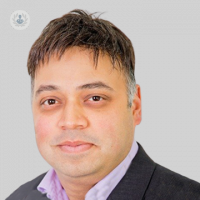Wigan-Falkland Islands link how Wrightington Hospital orthopaedic treatment
Autore:Wrightington Hospital in Wigan and the Falkland Islands’ only hospital, the King Edward VII Memorial in Stanley, are poles apart by location (7,934 miles to be exact), but an ambitious and ever-strengthening partnership is bringing these two hospitals closer to provide the residents on the Falkland Islands access to world-class orthopaedic care.
We spoke to leading consultant orthopaedic surgeon, Mr Amol Chitre who regularly flies out to the islands to provide specialist care, to explain more about this special partnership, what it means for both the residents on the islands and the expert surgeons who travel there to operate and exactly what the future of this partnership entails.

How did the partnership between Wrightington Hospital and patients living in the Falkland Islands come about?
The story started with a 15-year-old boy who had fractured his collarbone. The local hospital in the Falkland Islands did not have the expertise to treat the injury so the medical team were struggling to find a hospital willing to help. Luckily, the hospital manager who was seconded there at that time was local to Wrightington and she contacted us to see whether there was any possibility that we had the necessary expertise. Despite being local to the area, she wasn’t aware there was a world-renowned orthopaedic centre on her doorstep!
We were happy to help, and once he was successfully treated, the medical team on the Falklands asked if we could turn it into a more formal partnership. Both our senior manager, Rebecca Lyon and I have visited the Falklands and managed to work out a plan whereby we provide our orthopaedic support.
How often do you or your colleagues fly over to King Edward VII Hospital to visit patients?
I have been out to visit once a year from 2018. The aim is to try and provide two visits a year, hopefully in a way that we can rotate through different specialities to provide different subspecialty input and perform any procedures out there that we can. This is possible for smaller operations, but for some bigger procedures - such as hip and knee replacement surgery - we have to arrange for the patients to be brought over to the UK.
In my visits to the islands, I have now seen nearly 200 patients – over 5% of their population!
Do patients from the Falkland Islands also go to stay at Wrightington Hospital?
We have a specialist team that gets involved with patients that need to come to the UK for treatment. Whilst the actual in-hospital stay is not any different to that of a UK patient that requires the same operation, we can’t discharge them straight back home! The team will be involved with finding suitable accommodation nearby and arranging all their relevant therapy needs after surgery, as well as coordinating the timing so that we minimise the time they have to be in the UK to what is absolutely necessary.
How are these patient cases organised so that they can come over to the UK?
The logistics behind delivering the same high level of care to people travelling almost 8000 miles for their surgery is definitely more complicated and requires careful planning. Once we know that a patient needs to come over for surgery there is regular communication between the team at Wrightington and the patient and medical services over in the Falklands.
As well as video surgical consultations, there will be a remote pre-operative assessment with the anaesthetic team, so that any necessary investigations that can be done locally are done and any that need to be done on arrival in the UK can be planned. The patient will also have an individualised assessment and plan regarding how soon before surgery they need to attend, how long they will likely be in hospital for and how long they will need to spend in the UK after surgery. In addition, they will get input from our therapies teams (physiotherapy and occupational therapy) to ensure they are as well-prepared that they can be.
Why do you think patients are happy to travel all the way from the Falklands to Wrightington Hospital?
The thing that I am most struck by is how thankful people are. They know that they are coming to a world-renowned centre of excellence for orthopaedic surgery and are hopefully reassured by the input they get from the start of the process.
It is easy to for us to think of what we do and the service we provide as routine, but it’s sometimes only when we do something as out of the ordinary as this that we appreciate what a difference we are making to people. Wrightington Hospital is where Sir John Charnley developed his groundbreaking hip replacement techniques and we continue to have some of the best results for orthopaedic surgery in the world.
What would you like to see happen in the future of this partnership?
We have future plans to rotate different surgeons going out to the Falklands. We can hopefully provide more surgery locally if at all possible.
In the longer term, I have been involved with trying to explore whether we could perform some of the bigger surgical procedures, such as hip and knee replacement, out in the Falklands. This has made me aware of just how complicated a process this actually is. From configuring a theatre to correct specification, to ensuring appropriate staff are present, arranging theatre equipment to cover all eventualities and finally, making sure the right pre- and post-operative care is available is a much bigger undertaking than I had ever imagined!
Mr Amol Chitre is an expert orthopaedic surgeon specialising in hip and knee replacement surgery, knee arthroscopy and joint pain treatment. To book an appointment with him, visit his Top Doctors profile and check his availability.


